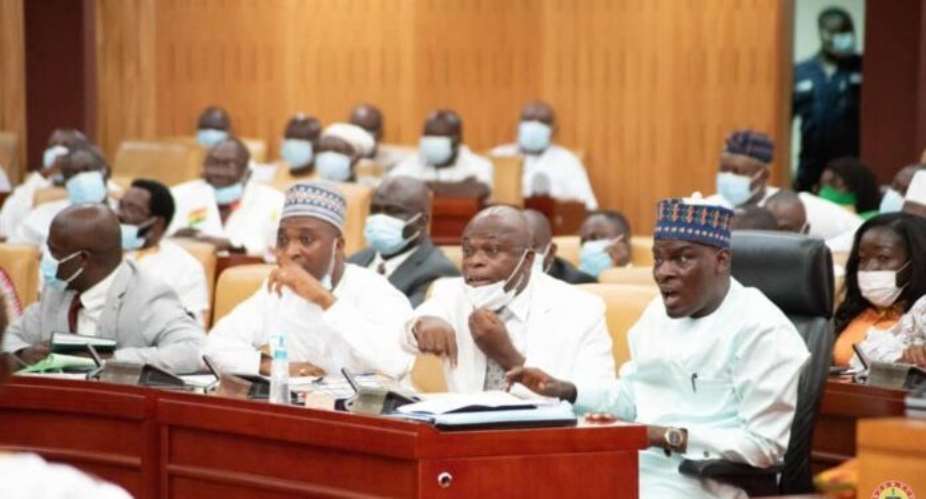The Minority in Parliament has reacted to the Supreme Court’s ruling that says a Deputy Speaker presiding over proceedings in Parliament has the right to vote on matters and also be counted as part of the quorum for decision making in Parliament.
According to the Minority Leader, Mr Haruna Iddrisu, the judgment is a “travesty of justice” and failure of the judiciary on Parliamentary democracy.
“From today, maybe there will be a new deviation of who a First or a Second Deputy Speaker of Parliament is. Maybe, they don’t deserve us according to them the offices they occupy, maybe that is what the Supreme Court is ruling. We will just recognise them as MP of Fomena and MP for Bekwai and nothing more,” Mr Iddrisu said in a reaction at a press briefing in Parliament.
In a unanimous decision Wednesday [March 9, 2022], a seven-member panel of the apex court held that upon a true and proper interpretation of Article 103 and 104 of the 1992 Constitution, a Deputy Speaker who happens to be a member of Parliament does not lose his right to take part in decision making in Parliament, reports Graphic Online’s Emmanuel Ebo Hawkson who was in the courtroom.
In view of the decision, the apex court held that the passing of the budget on November 30, 2021 in which Mr Joe Osei Owusu , the first Deputy Speaker counted himself as part of the quorum, was valid.
Also, the court has struck down order 109(3) of the standing orders of Parliament which prevented a deputy speaker presiding from voting, as unconstitutional.
The court gave the decision today after it dismissed a writ by a law lecturer, Justice Abdulai, who was challenging the decision of Mr Owusu to be counted as part of the quorum to pass the budget.
The unanimous decision was given by Justices Jones Dotse, Nene Amegather, Prof Ashie Kotey, Mariama Owusu, Lovelace Johnson, Clemence Honyenuga and Yonny Kulendi.
The court did not give its reasons for the decision but said the reasons would be filed by Friday at the Court’s registry [March 11, 2022].
They described the ruling by the apex court as a “judicial interference in time-tested parliamentary practice and established conventions.”
Reacting, the Minority Leader said “This ruling by the Supreme Court, to put it aptly, is judicial support for Electronic Transfer Bill (E-levy), nothing more, for a struggling economy in distress and a judicial support for the restoration of a matter they have said that it is constitutional.
“It is repugnant to the provisions of article 102 and 104 but they are clothed with the authority and mandate to interpret the law and this is a travesty of parliamentary justice and is a stab in the growth and development of multi-party constitutional democracy built on the spirit and principle of checks and balances
Mr Iddrisu said in civilized democracy everywhere in the world including the United Kingdom (UK), the presiding officer’s vote was discounted.
He thus said it was not for nothing that Article 102 provided a person presiding shall have no original nor casting vote.
He described as intriguing to hear that while the nation awaited the full reasoning of the Supreme Court, one of the justices of the apex court said “the quorum in Article 102 is not the same as Article 104.”
“That is the ruling but we know that for quorum, Article 102 is authoritative on the composition of quorum for Parliament for the purpose of conducting business.” “We cannot see any material difference in the provisions of Article 104 but for their purposes they have said that interpret Article 102 differently and separately from Article 104.”
The leader said the judiciary was also failing Ghana’s Parliamentary democracy in their inability to appreciate the true meaning of Article 110 of the 1992 Constitution that Parliament shall, by Standing Orders, regulate its own proceedings.
“We regulate our own proceedings and today reference is made to the 1992 Constitution and not to the Standing Orders of Parliament of Ghana in particular Standing Order 13.”
---Graphic.com





 S.Africa Zuma vows to continue to fight 'rigged' elections
S.Africa Zuma vows to continue to fight 'rigged' elections
 Hajj pilgrims 'stone the devil' as Muslims mark Eid al-Adha
Hajj pilgrims 'stone the devil' as Muslims mark Eid al-Adha
 Akufo-Addo preaches peace as Ghana marks Eid-ul-Adha
Akufo-Addo preaches peace as Ghana marks Eid-ul-Adha
 GACL investigating alleged thievery, extortion at Airport
GACL investigating alleged thievery, extortion at Airport
 Consult traditional authorities on education policies – Warlord to government
Consult traditional authorities on education policies – Warlord to government
 W/R: Cape Coast Teaching Hospital suspends haemodialysis service
W/R: Cape Coast Teaching Hospital suspends haemodialysis service
 Oti Region: Rainstorm hits Kadjebi, 52 households, 15 stores, school affected
Oti Region: Rainstorm hits Kadjebi, 52 households, 15 stores, school affected
 Let ideas, policies and solutions guide you in choosing president — Bawumia to G...
Let ideas, policies and solutions guide you in choosing president — Bawumia to G...
 Ghana needs leaders with integrity to end corruption, emigration crisis – Kofi A...
Ghana needs leaders with integrity to end corruption, emigration crisis – Kofi A...
 EU to ban artificial smoky snack flavourings over cancer fears
EU to ban artificial smoky snack flavourings over cancer fears
